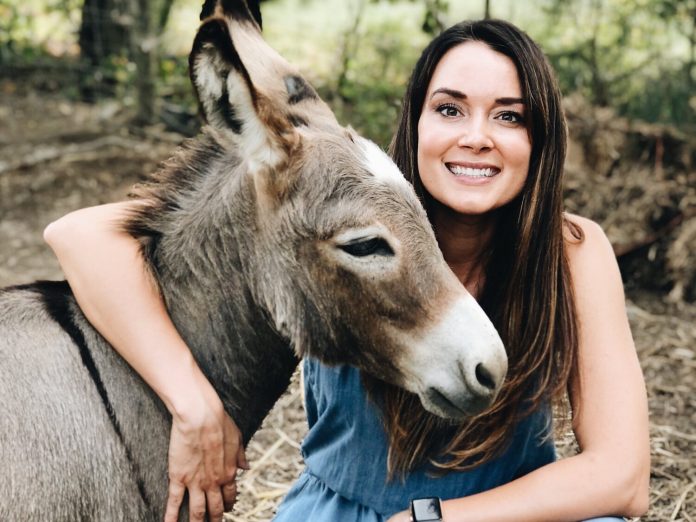You Have a Donkey?
It’s been a few years since my brother and his family have “gone country.” To their three cats, they added rabbits, then chickens, and a cow.
They have since added a couple of pigs, a goat, sheep, and two dogs. Now, they have a sweet donkey named Dixie.
“Seriously? You have a donkey?” I asked. “As in an ass?”
Let the Off-Color Jokes Begin
From that point, the off-color “ass” jokes poured forth, and they haven’t let up. He also gets playfully teased at work, as coworkers and others remark:
“That is one mighty fine ass you have.”
“You really showed your ass.”
“Can you bring your ass over here?”
“What a big ass you have!”
“Is your wife riding your ass again?”
“Did you spend the weekend on your ass?”
“Can I touch your ass?”
You’d Swear We Were in Eighth Grade
With all the uncontrollable giggling and double entendres, you’d swear we were a bunch of eighth-graders!
Dixie is such a friendly donkey, coming when called and braying when she feels lonely or sees people approaching. Although she has the run of the large fenced-in backyard, Dixie perceives herself as part of their family. Sometimes she makes her way to their deck. (Does she want in?)
She is most at home when my brother’s five kids are feeding her by hand or riding her with great drama, cowboys and Indians style.
Grow Up for Just a Minute, Will You?
No matter who we are, we all have a story to tell—no matter whether we are two- or four-legged, long-eared or not. Dixie and her donkey friends are thus not all that different from humans.
Donkeys don’t want to be the “butt of jokes” any longer (sorry, there I go again!). As a result, they are willing to share some of their life lessons with you—if you’ll grow up for a minute. I’ll try, too, but I can’t promise miracles.
Lesson 1: Work Hard and Bray a Little
With over 40 million donkeys worldwide these strong, sure-footed animals know the value of hard work. The vast majority of donkeys serve as draught or pack animals in underdeveloped countries.
Donkeys have been employed as working animals for more than five millennia, chiefly in agriculture and in transporting both goods and people. They are also used as companion animals in developed countries.
Because donkeys are generally friendly and intelligent creatures, people use them for a variety of other tasks as well, including:
Guarding flocks of sheep against fox, dogs, and coyote predators
Serving as soothing companions to racehorses, injured and nervous horses, and foals during weaning
Assisting backpackers with hauling their equipment, and
Providing rides and companionship for children and people with disabilities.1
The Poor Donkeys of Santorini
Unfortunately, sometimes we humans take advantage of donkeys’ work ethic. Take the case of the donkeys of Santorini, Greece, who must climb up and down 600 steep, slippery steps as many as seven times a day.2
They zig-zag their way along an 800-foot cliff hefting obese tourists—some of whom weigh more than the donkeys themselves.
The tourists disembark cruise ships and imagine that it would be quaint to use rustic transportation locally—even though a modern cable car has been established compliments of a humane organization that was concerned about the donkeys’ welfare.
The animals are whipped, permitted little rest in the heat, and often wear ill-fitting harnesses that create open sores. Unfortunately, the donkeys’ occasional loud braying is not enough to end their plight.
Why? Tourist demand perpetuates the practice.
Benefits of Working (For Humans)
While humans don’t have to be beasts of burden, there are benefits from working hard and being useful. (You can do this both inside and outside of the home.) Live Your Dream!
Studies have shown that paid employment is related to:
Reduced risk of depression
Greater life satisfaction
Higher self-esteem and
Fewer doctor visits.3
That’s because research also found average decreases in mental health among people who went from unemployment to poor quality jobs—that is, jobs with low levels of control, low job complexity, high job insecurity, and unfair pay.
Fortunately, we usually have a voice and a choice with employment, so don’t let coworkers or employers treat you like those poor donkeys of Santorini! Bray a little when you need to.
Know Your Donkey Cross-Breeds
When donkeys are cross-bred with their creature cousins, we get a variety of hybrids.4
Here’s what they are called:
Mule: male donkey crossed with a female horse
Hinney: male horse crossed with a female donkey
Zonkey: a male zebra and female donkey
Zebret: a female zebra and male donkey
Lesson 2: Have a Wit That’s Even Sharper Than Your Teeth
Over many centuries, donkeys have adapted to dry, warm environments, and have become accustomed to traversing as much as nine miles (approximately 15 km) of rough terrain daily.5 Traditionally, donkeys have fed off the sparse, arid grasses which were highly abrasive on their teeth.
As a result, they evolved teeth that are both sharp and which wear constantly.
Today, dental disease in donkeys is second only to hoof problems. Donkeys require regular dental check-ups just like humans do to prevent
Abscessed teeth
Weight loss
Periodontal disease
Teeth that are loose, missing, or growing into the sides of their mouths (ouch!)
A donkey with nasty breath therefore may likely be a donkey with dental issues. Understandably, it may also be one in “foul” humor.
And humor is important…
Donkey Facts: Did You Know?
Jackass refers to a male donkey, while jenny or jennet refers to a female donkey.
In sports or poker, a “donkey” is an unskillful player.
Loud donkey brays (he-hawing) can be heard over distances of up to two miles (three kilometers).
The first donkeys came to the Americas in 1495 aboard the second voyage of Christopher Columbus.
“Donkey” is a word that was invented in the late 1700s, although no one is sure of its precise origin. It originally rhymed with “monkey.” Before that, donkeys were known as “asses.”
LOL: The Benefits of Humor
While I’m certainly not advocating “biting” humor, there is a range of benefits to a chortle, a guffaw, or a good belly laugh.
You know the type of hearty laugh that involves accidentally snorting through your nose? Go ahead! That is very healthy laughing, even if it is a bit embarrassing!
Research has found that laughter is associated with these health-boosting benefits:
Reduced levels of cortisol, the stress hormone. (Chronically high levels of cortisol are implicated in weight gain and the risk of cardiovascular disease and stroke.)
Higher levels of endorphins, the body’s natural painkiller. This increases our tolerance for pain.6
Increased friendliness, sense of belonging, and attractiveness to others
Greater memory for humorously presented material
More helping behavior, and more satisfying relationships
Enhanced problem solving and creativity, as humor encourages you to look at things from a different perspective. Humor involves connecting things that previously had no obvious linkage.
A stronger immune system.
Feelings of relaxation, as blood pressure and heart rate fall below normal levels.
Better mood, a sense of well-being, increased self-esteem, and optimism.
Lower levels of depression and anxiety.
Humor therapy has been demonstrated to be as effective in treating depression as anti-psychotic drugs.7 Humor is also used to help dementia patients in lieu of anti-psychotic medication and as a complementary therapy for assisting cancer patients and chronic pain sufferers in coping with their illness.8
As if all of these benefits were not enough, there are social and cognitive benefits to humor, too:
Lesson 3: Know What You Want
Donkeys have an unfair reputation for being stubborn, difficult, and hard to budge. In their defense, however, I shall explain, although mind you, they don’t think they need this.
Donkeys are intelligent and curious creatures who are not easily startled. Whereas horses may rear up, buck, or bolt when frightened, donkeys tend to stop and assess the situation.9 If they sense that you are leading them into a situation that is against their best interests or which is unsafe, they stop to assess it.
Independent thinkers that they are, donkeys ponder, “Why should I do this? Is this person seeing the red flags I am? Is this the best thing to do? Is it safe for us both?”
Then they don’t do it unless you can convince them through deed and action that they can trust you to lead them through this. Whipping, bribery, and other untrustworthy acts simply won’t work.
Like a donkey, you should know what you want. Then, evaluate the situation for yourself.
Sometimes that means being called belligerent, stubborn, difficult, hard to get along with, or worse! That’s okay. You need to protect yourself and be comfortable with your own decisions.
Don’t let others goad you into making choices you are uncomfortable with, especially if you feel these choices might be against your best interests or safety.
Go willingly only when you’re ready—even if they call you a “stubborn old ass.”
Hoofin’ It
Before I offend anyone else, this donkey lover is going to hoof it. Next time you see one of these smart assess—I’m talking about the donkeys—know that they are also sensitive, inquisitive, hardworking, and have a story to tell.
Also know that you can learn from them if only you’ll listen.
He-haw! He-haw!
Does Eeyore Suffer From Depression?
I’m worried about Eeoyre—you know, Disney’s Dismally Depressed Donkey. His glum mood and self-defeating talk have gone on far too long—since I was a child or even longer. Frankly, he’s a Downer Donkey, and he needs our help.
Before you think I’m the one with the “issue,” I’ll have you know that I’m not the only one who’s noticed Eeyore’s pathological downcast demeanor.10
I’ve tried talking to Tigger about it, but he has an excessively low attention span, jumping fervently from topic to topic. I couldn’t keep him focused, so I gave up and went to Pooh. However, Pooh was preoccupied as usual with where he would get his next Hunny fix. (Sounds like addictive behavior to me.)
Owl only wanted to talk about himself. Piglet was too afraid to talk. (I’m worried about his stutter.) Christopher Robin didn’t believe I was real because I wasn’t an animated character.
Friends, What Do We Do?
Here’s what I think our Downcast Disney Donkey has:
Dysthymic Disorder, a state of chronic low-grade depression (at least two years). He seems to meet most of these criteria:
Overeating or poor appetite (Yes, Eeyore is portly!)
Low energy or fatigue
Low self-esteem
Poor concentration or difficulty making decisions
Feelings of hopelessness.11
Do you think Eeyore has unresolved issues regarding the loss of his tail? Perhaps the repeated loss of his home has caused him this distress?
Perhaps he could benefit from Humor Therapy. Tell me if you agree he needs our help. What are the next steps? We need him to flourish anyway!



























